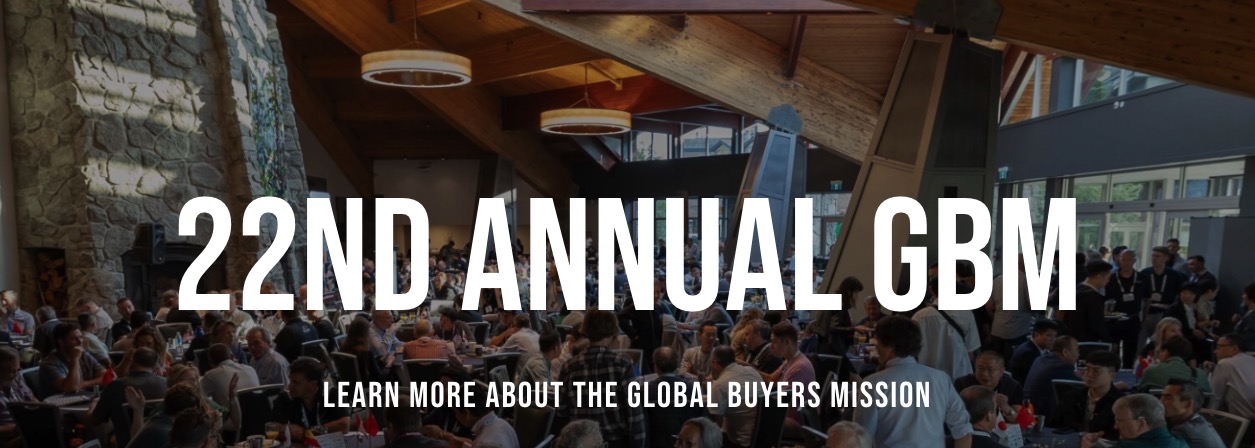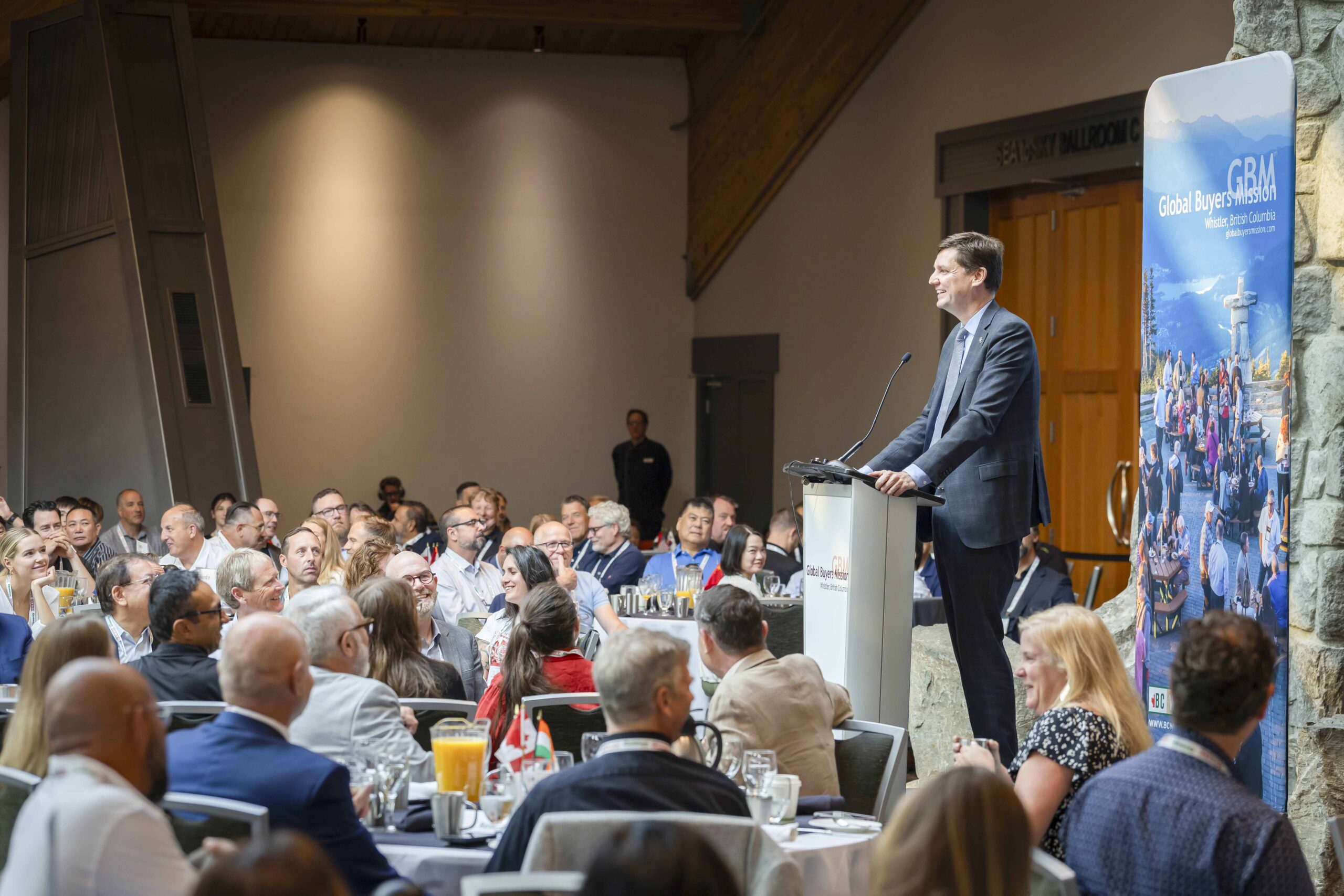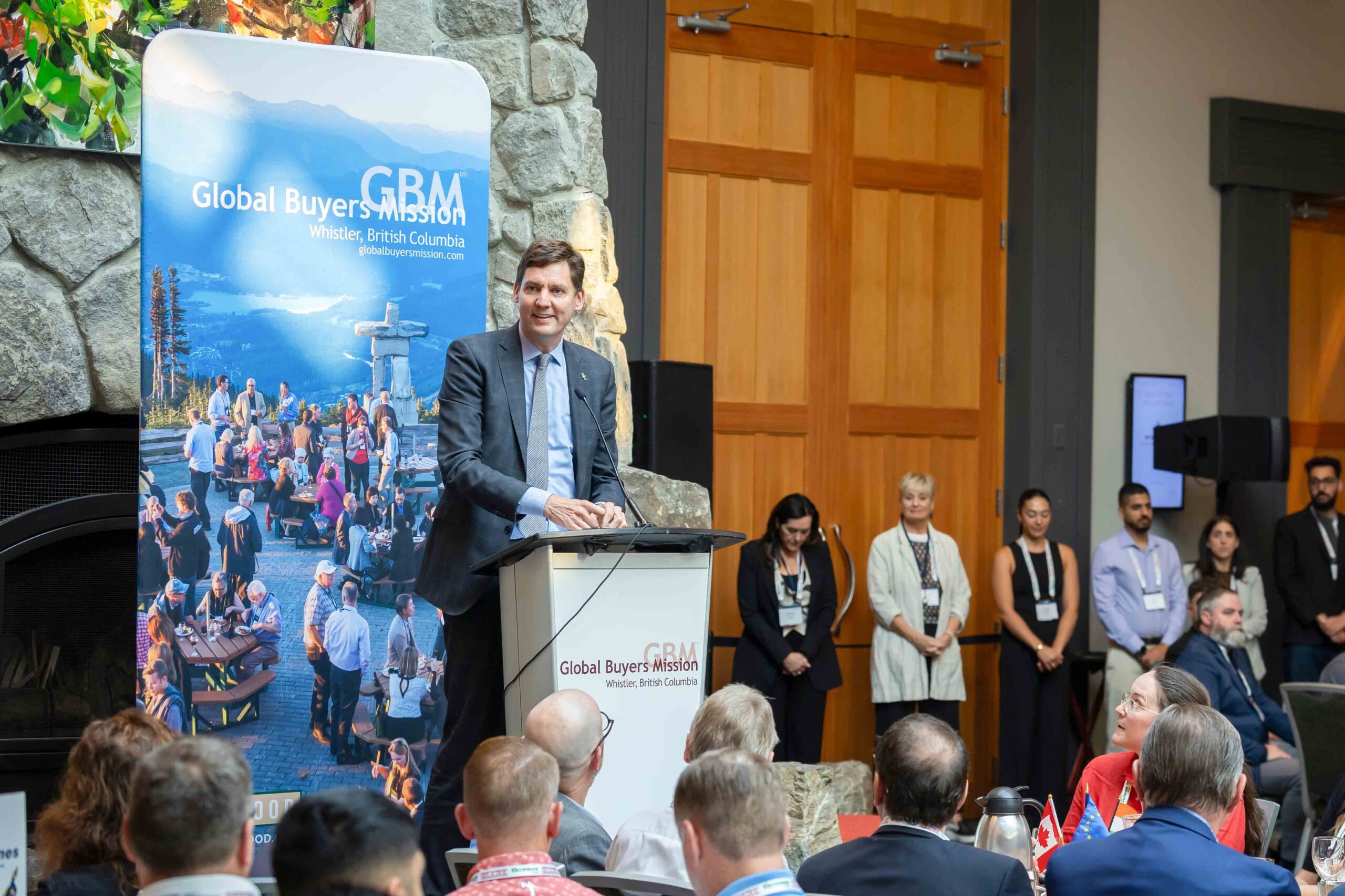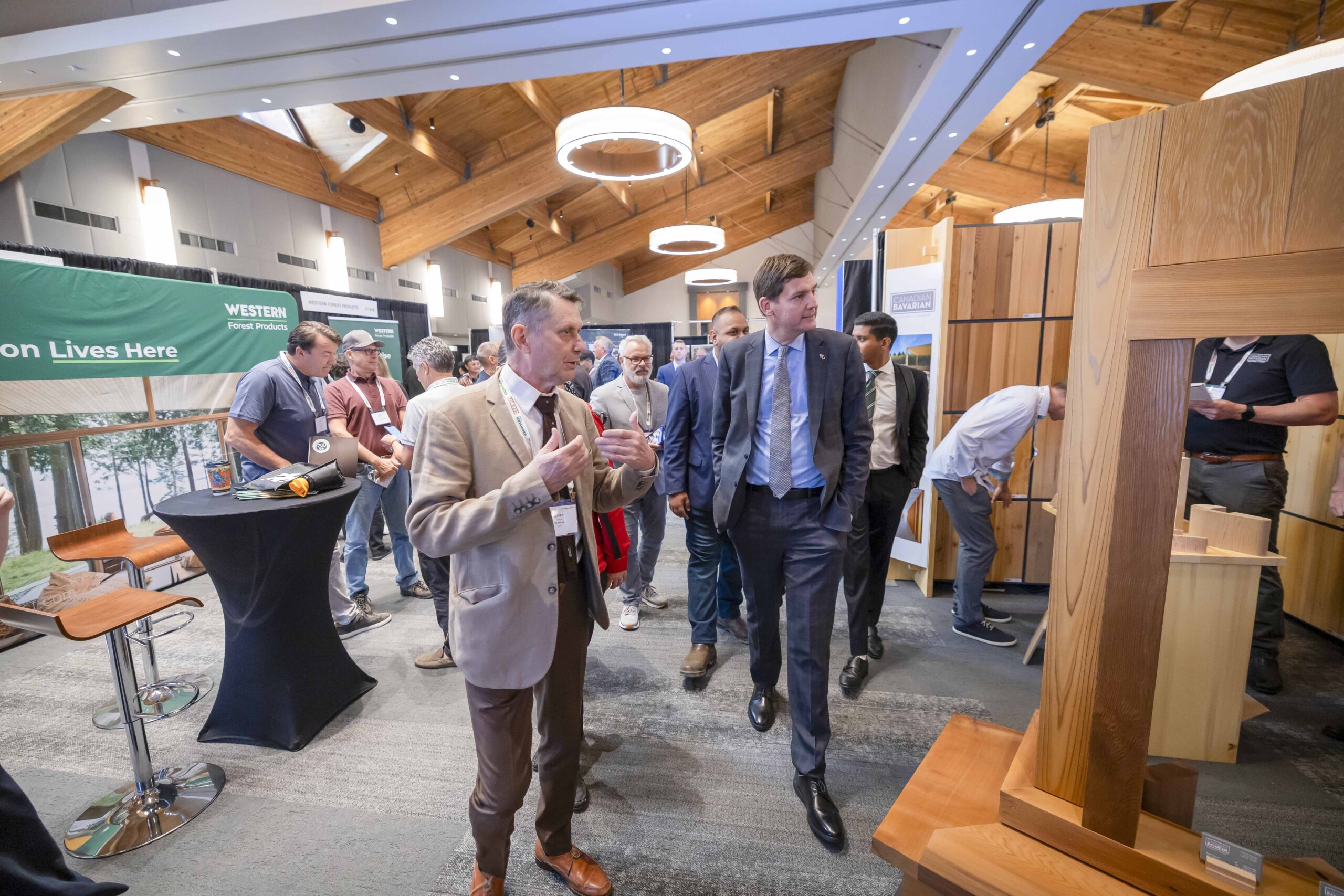 BC Wood’s 22nd Annual Global Buyers Mission (GBM) opened in Whistler, BC on Friday morning, with Premier David Eby declaring the tradeshow floor open and underscoring the value-added sector’s critical role in British Columbia’s economy and its importance to international markets. The GBM is the province’s signature trade event for value-added wood producers and global buyers, bringing together Canadian manufacturers with pre-qualified delegates in an exclusive, business-focused environment. Nearly 600 participants attended this year’s gathering, including specifiers, government representatives, and international buyers from across Asia and beyond.
BC Wood’s 22nd Annual Global Buyers Mission (GBM) opened in Whistler, BC on Friday morning, with Premier David Eby declaring the tradeshow floor open and underscoring the value-added sector’s critical role in British Columbia’s economy and its importance to international markets. The GBM is the province’s signature trade event for value-added wood producers and global buyers, bringing together Canadian manufacturers with pre-qualified delegates in an exclusive, business-focused environment. Nearly 600 participants attended this year’s gathering, including specifiers, government representatives, and international buyers from across Asia and beyond.
BC Wood CEO Brian Hawrysh welcomed attendees, noting the sector’s resilience through recent challenges. “We’ve made it through a couple of difficult years, and we’ve got some challenges ahead of us,” he said. “But we’ve come through stronger than we’ve been in the past, even as market disruptions with our friends south of the border continue.” He thanked provincial and federal partners, corporate sponsors, and BC Wood’s international mission leaders for their support in making the event possible.
Board chairperson Kelly Marciniw of Zirnhelt Timber Frames took the stage, opening with an acknowledgement of the unceded territories of the Lil’wat and Squamish peoples. She urged participants to think broadly about how wood and biomaterials can substitute into new products and applications. “When you go into the trade show floor, I encourage all of you to think expansively about the different products as well as different applications that we can substitute more wood, forestry, and other biomaterial products for,” she said. To buyers and specifiers, she emphasized the value of sourcing from BC: “Think about the additional value that you bring by bringing in products that are manufactured from here in British Columbia using ethically harvested forestry products from our province and our country.”
Marciniw also paid tribute to long-time BC Wood staff member Randi Walker, who is retiring after 17 years of service. “She has been a strategic force about making this event what it is here today,” she said, encouraging attendees to share memories and appreciation before her departure. “On behalf of the BC Wood Board, we wish you the very best in your retirement.”
 Turning to the Premier, Marciniw recalled first working with him when he was Housing Minister and praised his openness to finding workable solutions for the timber building sector. “I found him curious, really trying to understand the core issue and enabling his staff to develop solutions for our sector,” she said. She added that she was pleased to see him become Premier at a time of generational change, when BC’s forest sector has an important role to play in providing those solutions.
Turning to the Premier, Marciniw recalled first working with him when he was Housing Minister and praised his openness to finding workable solutions for the timber building sector. “I found him curious, really trying to understand the core issue and enabling his staff to develop solutions for our sector,” she said. She added that she was pleased to see him become Premier at a time of generational change, when BC’s forest sector has an important role to play in providing those solutions.
Taking the stage, Premier Eby opened with a lighthearted aside about leaving home early on his wife’s birthday. “Today is my wife’s birthday,” he said, drawing laughter and applause. “To her credit, the amazing woman I married, her reaction was ‘wooden,’” he joked. He then shifted to the broader significance of the gathering, calling the GBM “a crucial event for the province of BC and for our trade diversification work.”
The Premier highlighted the global reputation of BC’s producers, citing a recent visit to Spearhead, a Nelson-based firm supported by a provincial manufacturing grant. “If you have functionally unlimited resources, you could buy any product to build your house with, to decorate your home with. But these customers are choosing BC wood products because they are the best in the world,” he said. At the same time, he stressed that BC wood is not only for the wealthy: it is also “the functional and structural building block of the most affordable housing in North America. It is the strongest, it is the straightest, it is the most affordable.”
Eby underscored the importance of BC’s international buyers, pointing to his recent experience at Expo 2025 Osaka, where BC timber tiles were featured. “These are the kinds of products that will lead the way in ensuring that the forest industry remains strong and diverse here in British Columbia, providing jobs and support for families right across the province,” he said.
At the same time, he acknowledged the dual challenges of natural and man-made disruptions, from wildfires and the mountain pine beetle to softwood lumber duties. “Our friends and allies in the United States, who remain friends and allies, but are under the leadership of an individual who somehow sees affordable BC timber products as a threat to the United States, at a time when the government is simultaneously recognizing a housing crisis in the United States and a need to improve affordability for people,” he said. He argued that Canada and the US have an opportunity to reset their relationship, suggesting that the $8 billion currently held in a tariff account could be used “to promote wood products across North America for a net win for everybody.”
 The Premier pointed to the need for federal recognition of the sector’s importance, arguing that BC’s forest industry deserves the same treatment Ottawa affords autos in Ontario or canola in Saskatchewan. He contrasted cuts to overseas wood promotion under the previous federal administration with new commitments by Prime Minister Mark Carney. “Under Prime Minister Carney’s leadership, Canada has committed $1.2 billion to support the forest sector. And we believe and we’re advocating for the lion’s share of that support to come to BC, given the disproportionate role we play in the forest sector in Canada.”
The Premier pointed to the need for federal recognition of the sector’s importance, arguing that BC’s forest industry deserves the same treatment Ottawa affords autos in Ontario or canola in Saskatchewan. He contrasted cuts to overseas wood promotion under the previous federal administration with new commitments by Prime Minister Mark Carney. “Under Prime Minister Carney’s leadership, Canada has committed $1.2 billion to support the forest sector. And we believe and we’re advocating for the lion’s share of that support to come to BC, given the disproportionate role we play in the forest sector in Canada.”
Eby also outlined steps the provincial government is taking to support the industry, including a pause on stumpage payments. “The forest sector needs immediate support, which is why our government is putting a two-month pause on stumpage, on monthly timber bills that are paid by the industry for access to our forests to give some breathing room to the forest sector,” he said. He emphasized the importance of mass timber as a low-carbon, cost-effective building material, noting that BC leads North America in mass timber construction. “There are so many opportunities for us right now, and they are matched, unfortunately, by threats. But we will be successful as a group if we push together in ensuring we’re expanding those markets.”
Eby concluded by situating the forest sector in its historic and future context, calling it “a product that has supported generations of British Columbians.” He told attendees: “From the earliest days, from the 1820s, when the commercial industry first started here in BC, through to today, the forest sector has changed and grown and evolved, and we will continue to do so, and today’s event is a part of that. I want to reassure you that our forest minister, Ravi Parmar, myself, and our entire government are committed to supporting the sector through this incredibly challenging time. And we’re going to come out the other end more successful, more resilient, and deliver the prosperity that British Columbians deserve and that the forest sector has delivered for generations in this province.”
With that, the Premier officially declared the 22nd Global Buyers Mission open, inviting the audience to rise and head onto the tradeshow floor. “Please rise and head on into the mission and buy as much as you can,” drawing laughs as delegates joined exhibitors to begin a day of business.
